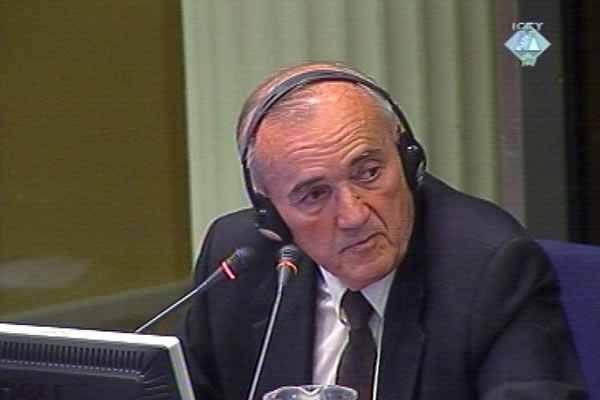Home
DID COMMUNICATIONS IN REPUBLIKA SRPSKA FUNCTION?
After prosecution expert Dorothea Hanson completed her evidence on crisis staffs in Republika Srpska, Dragan Kezunovic was called to the witness stand. Through the testimony of the former chief of the RS MUP Communications and Encryption Department, the prosecution wants to prove that there was a well-developed and regular system of reporting and communications in Republika Srpska. Karadzic denies this claim
 Dragan Kezunovic, witness at the Radovan Karadzic trial
Dragan Kezunovic, witness at the Radovan Karadzic trial The trial of Radovan Karadzic continued today with a brief reappearance of prosecution expert Dorothea Hanson. Hanson drafted a report on the crisis staffs in Republika Srpska. The Trial Chamber granted Karadzic’s request to ask the witness some more questions about the agencies for resettlement and exchange of property. The agencies operated under the auspices of the crisis staffs.
In her evidence last week Hanson said that such agencies assisted in the relocation of non-Serbs from the municipalities under the Serb control. Hanson also noted that while drafting her expert report she saw a number of documents in which Muslims and Croats ceded their property to the municipal authorities.
Today Karadzic wanted to know ‘why people would give away their property when there were exchange commissions’. According to him, ‘everything was done in line with the law’ and the Serb authorities in fact made it possible to those who had purportedly left their property behind voluntarily because of the ‘winds of war’ to obtain other property in their new place of residence. ‘Let’s assume that the people were under such pressure that they could leave only if they signed away their property’, the witness replied. Hanson added that the ‘exchange of property was obviously not an option for everybody’.
The prosecution then called Dragan Kezunovic, former chief of the Communications and Encryption Department in the Republika Srpska MUP. Kezunovic had already testified about the same issues at the trial of former RS police officials Mico Stanisic and Stojan Zupljanin. The prosecution tendered into evidence a series of documents, mostly receipt cables, daily bulletins and other memos the Serbian security services centers exchanged during the war. The prosecution wants to prove that Republika Srpska did have a well-developed and regular system of reporting and communications.
In the cross-examination, Karadzic tried to prove that the communications system didn’t function well. Karadzic put to the witness some key reasons why the communications system ‘failed’ at the beginning of the war, and the witness confirmed that had indeed been the case. According to Karadzic, the main telecommunications centers were located in towns under Croat and Muslim control and the centers in newly established Serb municipalities struggled with a shortage of professional staff. It was difficult to repair communications because of the fighting. Power outages and shortage of fuel, spare parts and other equipment were another major problem.
Karadzic will complete his cross-examination of Dragan Kezunovic tomorrow. Another communications officer from Republika Srpska, Ranko Vukovic, who was chief of the Communications Center in Pale during the war, will take the stand.
Linked Reports
- Case : Karadzic
- 2011-06-17 DENYING THE ‘POLICY OF RESETTLEMENT’ OF MUSLIMS AND CROATS
- 2011-06-15 KARADZIC: EVERYTHING WAS IN LINE WITH THE LAW
- 2011-06-09 CRISIS STAFFS RELOCATED PEOPLE AS PART OF POLICY
- 2011-06-21 KARADZIC’S COMMUNICATIONS DURING THE WAR
- 2011-06-22 ‘FRATERNAL RELATIONS’ BETWEEN THE SDS AND SERBIAN OFFICERS IN THE JNA
- 2011-06-23 TIME OF ‘PLAGUE’ IN PALE
